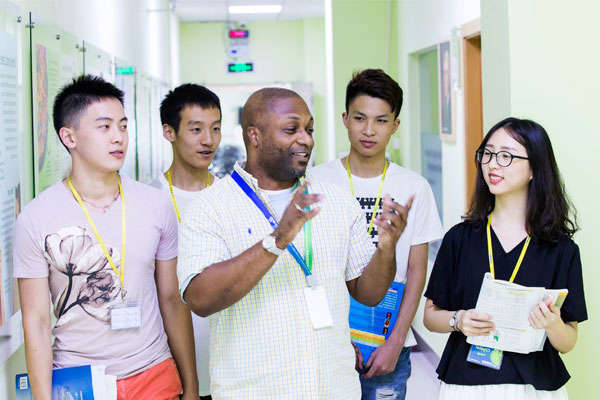双语阅读:每天9问,活出美好的自己(上)
时间:2016-12-07 17:24:35
来源:平和英语村 作者:平和英语村
Many great thinkers embraced the idea of constantly questioning things. As Albert Einstein reportedly said, "Learn from yesterday, live for today, hope for tomorrow. The important thing is not to stop questioning."
许多伟大的思想家都坚持对事情抱有质疑的态度。正如爱因斯坦在报道上说道:“学习昨天,活在今天,期待明天。重要的是绝不停止质疑。”
Of course, getting into the habit of self-reflection is easier said than done, as we often prefer to avoid asking ourselves the tough questions. But enduring this discomfort is well worth the effort, as it can result in the confidence boost necessary to perform better in our work and daily lives.
当然,养成自我反思的习惯说起来比做的轻松,就像我们常常喜欢逃避提问自己一些尖锐的问题一样。不过,去忍耐不安的感觉也非常值得一试,因为它能激发自信心,对于工作上和生活上表现得更好具有必要性。
Here are nine daily questions you can start asking today:
下面有9个可以从今天开始每天给自己提问的问题:

1. 'How do I see myself?
1.“我对自己的评价如何?”
"This questions gets at your likely unspoken beliefs about who you are," writes Wanleo.com founder and CEO Deena Varshavskaya on Quora.“
这个问题很有可能关乎你无法言喻的个人品质信仰,”选自 Wanleo.com的创始人兼总裁——Deena Varshavskaya在Quora上的回复。
She says that changing how you see yourself in various situations can also change your actions and, ultimately, who you are.
她表示,改变自己在不同情况下的评价方式还能改变你的行为,并且最终,改变你自己。
2. 'What pain do I want in my life?'
2. “我希望生活给我带来什么样的痛苦?”
Happiness requires struggle, as well as an understanding of what we are willing to struggle for, writes self-development blogger Mark Manson.
幸福需要奋斗,也需要我们愿意为某件事情而奋斗的理解。选自自我发展的博主Mark Manson的建议。
"What determines your success isn't 'What do you want to enjoy?' The question is, "What pain do you want to sustain?' The quality of your life is not determined by the quality of your positive experiences but the quality of your negative experiences. And to get good at dealing with negative experiences is to get good at dealing with life," Manson explains.“
决定你成功的要素不是‘你希望享受的是什么?’而应该是:‘你想承受怎样的痛苦?’生活的质量并不取决于你的积极经历的质量,而是消极经历的质量。如果你能很好地处理这些消极的经历,那么应付生活就不是难事了。”Manson解释道。
3. 'How are you doing?'
3. “你还好吗?”
Quora user Michael Hopkins writes: "It's silly, but it all started when I watched an episode of 'The Tick' where the Tick travels on a quest inside his own mind to seek the answer to any one question. When he finally meets his inner being, and can ask any question he wants, he asks something like, 'How are you doing?'
Quora网站的用户Michael Hopkins写道:“虽然这句话很笨,但这个习惯都始于我看到了‘闪电超人’里的一幕:超人在自己的内心畅游以追寻答案。当他最终找到了真我,还能提出任何问题的时候,他提出了类似‘你还好吗?’的问题。”
"I took from that a very profoundly meaningful lesson: At the center of each of us, this is the most basic and truest and most important question. It leads to so many internal conversations that we would all be better off having with ourselves each day."
“我从那一幕中学习到了意义深远的一课:在我们每个人的内心深处,这就是最基本的,最真实的也是最重要的问题。它能引发如此多的内心对话以致我们能每天好好地对待自己。”
4. 'What went well today?'
4. “今天遇到了什么好事?”
Harvard Business School professor Francesca Gino and her colleagues asked workers to spend 15 minutes at the end of their workdays writing about what went well that day, and they found that the journaling employees had 22.8% higher performance than those who didn't ponder on their workday.
哈佛商学院的教授Francesca Gina和她的同事们让一些职场人士在每天下班时花15分钟写下当天的状况,最后结果发现,每天进行工作记录的员工比那些没有思考过工作状况的员工的有着22.8%更优异的工作表现。
As former Tech Insider reporter Drake Baer points out, reflecting on the day's successes can help you incorporate those lessons into the next day. he writes.
正如Tech Insider前通讯员Drake Baer指出,反思当天的成就能让你把学到的经验运用到第二天。
本文链接:https://www.pinghe.com/study/Reading/article/2016-12-07/267.html




